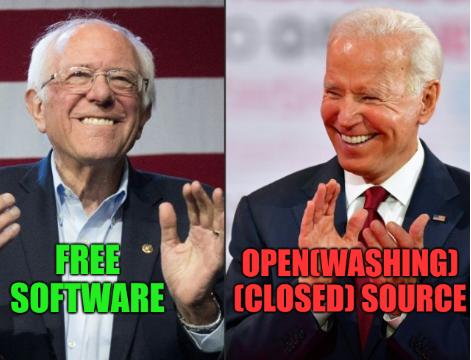
 Summary: The Free Software Foundation (FSF), which turns 36 later this year, is looking to raise money that helps support the GNU Project, soon 38 years old and likely the most important Free software project to exist (ever)
Summary: The Free Software Foundation (FSF), which turns 36 later this year, is looking to raise money that helps support the GNU Project, soon 38 years old and likely the most important Free software project to exist (ever)
IN PART I AND IN PART II we talked about a 'hidden hand' (but sometimes unwittingly revealed in IRS disclosures and "sponsors" pages) inside the Free software world. It's not hard to see why people who think like Richard Stallman and openly (or freely) berate things would bother those who are indirectly -- sometimes even directly -- complicit in bombings (killing civilians for profit) and would rather, instead, obsess/bicker about supposedly offensive words. Taming a community isn't easy because it's hard to fire or banish people (there's an alternative or parallel construct though; that's where the CoC becomes handy). That's setting aside extensive PR campaigns or even fakes/provocation efforts.
"It seems like with or without Oliva, the FSF is in decent hands now."The resignation of Alex Oliva wasn't as big a deal as we had imagined. Stallman's voice was "one of the friendly voices," Oliva explained. "He and I talked a lot about it." It seems like with or without Oliva, the FSF is in decent hands now. Not perfect, albeit decent. Nevertheless, it's easy to get the impression that the coup persists, especially each time the GNOME Foundation opens its mouth. But the GNOME Foundation's attacks on Stallman go well more than a decade back; we covered examples over the years and we saw two GNOME Foundation chiefs going to work directly to Microsoft, which doesn't inspire much confidence in the GNOME Foundation (the GNOME project itself is related to the GNOME Foundation but isn't entirely the same, just as GNU and FSF aren't the same thing).
"It's as ludicrous as IBM's claims that it confronts racism; in reality, IBM perpetuated and profited from direct and overt racism, not just institutionalised racism."As I worked rather hard researching for this series I generally came to the conclusion that the FSF is mostly the victim of provocation and destabilisation efforts. Some of them are directly corporate, albeit sometimes the corporations seem to be co-opting groups to do their biddings, in effect siccing them or unleashing them at projects/institutions that they hope to weaken (or whose agenda/steering they seek to undermine). In this video I discuss some of my findings so far and future parts will shed light on incidents never seen (or heard about) by the public before. I've long found it rather ironic that greedy and intolerant corporations claim to champion tolerance. It's as ludicrous as IBM's claims that it confronts racism; in reality, IBM perpetuated and profited from direct and overt racism, not just institutionalised racism. Microsoft sometimes tries to portray itself as a company that cracks down on crime (e.g. "cybercrime") when Microsoft itself was founded by convicts who spent the whole time (45+ years) committing crimes -- a tradition they maintain to this very day and extends well beyond the realm of software.
 How ethical is one who redefines ethics and then warps the abuser-victim narrative? We've seen this debated before, e.g. in the context of FSFE and Debian. There's a reason courts exist and due process is still cherished by most people (despite the costs). If we let mobs and rich people dominate the narratives, or if we let rich people weaponise online mobs, who stands to gain and who stands to lose? ⬆
How ethical is one who redefines ethics and then warps the abuser-victim narrative? We've seen this debated before, e.g. in the context of FSFE and Debian. There's a reason courts exist and due process is still cherished by most people (despite the costs). If we let mobs and rich people dominate the narratives, or if we let rich people weaponise online mobs, who stands to gain and who stands to lose? ⬆